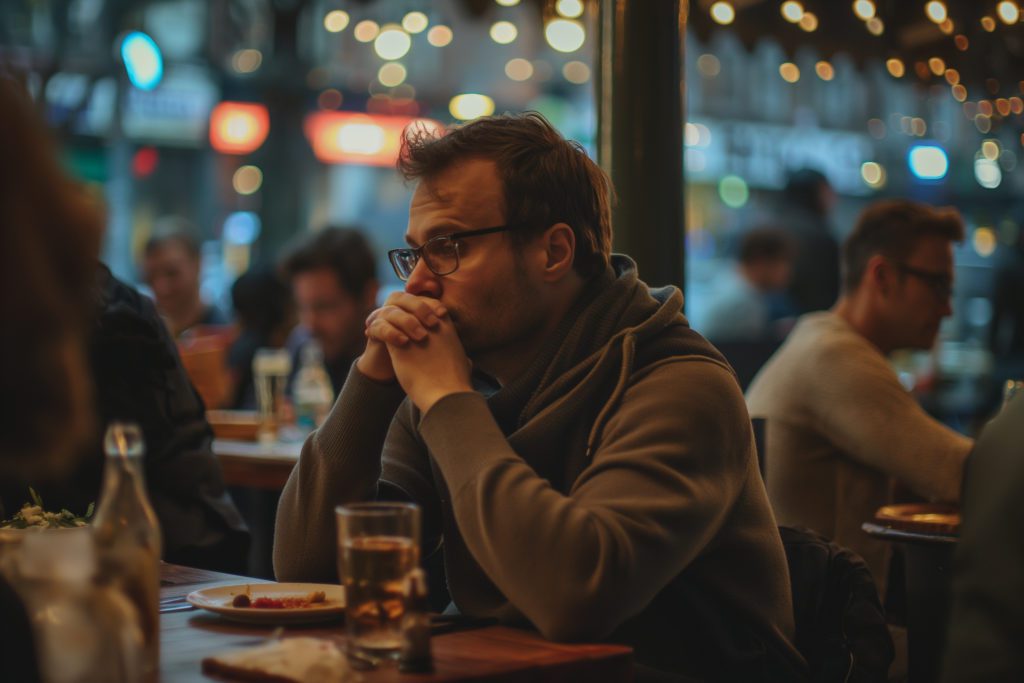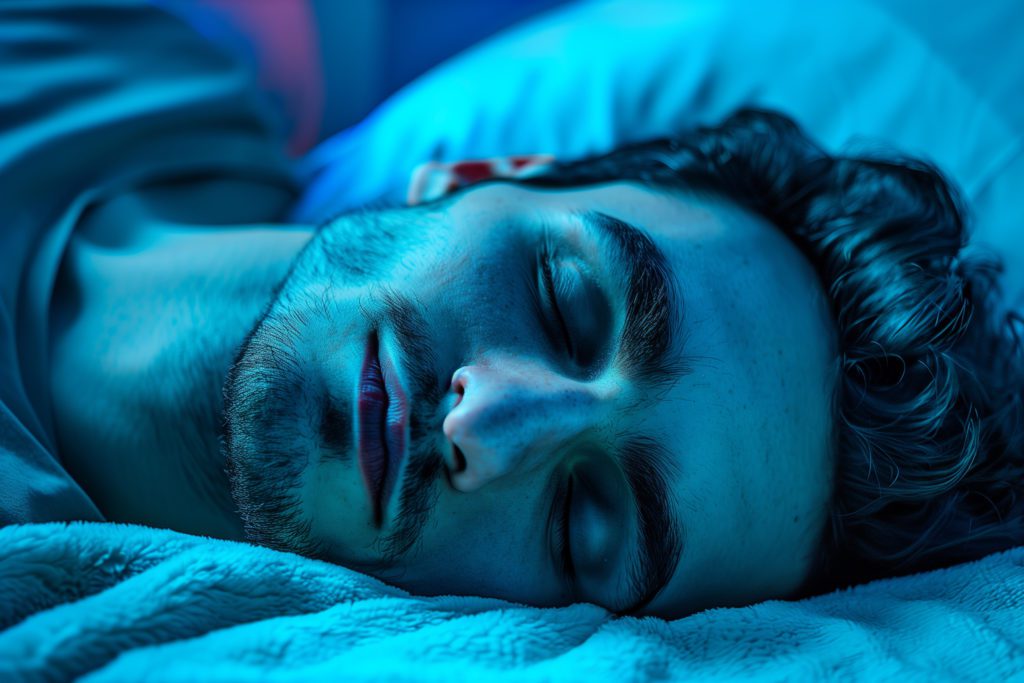
Sleep and Social Media: Understanding the Impact of Online Habits on Sleep
Science indicates that social media can have a strong negative impact on sleep. Here’s what the research says and what you can do to get better sleep.

How often do you lay in bed scrolling through Instagram or TikTok watching viral videos or funny memes until the wee hours of the night? Using social media apps can cut into your sleep time — preventing you from getting the recommended seven to nine hours of sleep a night.
A lack of quality sleep can negatively affect your mental health. It can make you feel sluggish and less alert the next day. Over time, sleep deprivation can put you at an increased risk for chronic conditions like heart disease, depression, high blood pressure…and the list goes on.
Let’s take a closer look at social media and its impact on sleep.
How Common is Social Media Use at Bedtime?
Surprisingly, social media is a big part of many people’s bedtime routines. It’s the last thing that many people do just before bed. In one study, more than 74 percent of participants used social media apps before bed.
Another study, this one conducted by The American Academy of Sleep Medicine, found that 80 percent of participants have lost sleep due to social media. For Gen Z, the sleep loss is even greater with 93 percent of younger participants losing sleep.
How Can Using Social Media Apps Before Bed Affect Sleep?
One study found that social media use before bed led to a number of negative outcomes on sleep, including:
- Poor Sleep Quality
- Increased time to fall asleep
- Difficulty maintaining sleep
- Shorter sleep duration
Another study found that people who use social media apps right before bed are more likely to have a shorter sleep duration and insomnia.
In a study of more than 1,700 young adults, it was found that engagement in social media during the last 30 minutes before bed was found to be the greatest predictor of a poor night’s sleep.
Why is Social Media Use Before Bed So Problematic?
Here’s how scrolling through social media apps before bed disrupts your sleep.
It Causes Anxiety
Social media can cause anxiety, which can negatively impact sleep. A 2020 systematic review found that social media had a strong negative impact on the mental health of users, including on anxiety levels. Anxiety causes you to feel tense and worried, which can keep you from falling asleep at night. After all, if you lay in bed and think about the posts you just saw on Nextdoor talking about the latest break-ins in your neighborhood, it can definitely keep you awake with worry.
It Can Be “Addictive”
One of the main reasons why social media use is problematic close to bedtime is because of its addictive nature. It’s meant to keep you awake and scrolling. Ever notice how easy it is to keep scrolling, video after video? You might start off browsing funny videos or new outfits, and before you know it, a couple of hours have passed. It’s now way past your bedtime. So, instead of now getting seven hours of sleep, you're down to five before you have to wake up for work.
Social media scrolling gives us a dopamine boost that results in a sense of pleasure. This makes us temporarily forget about the need for sleep. So, something as essential as sleep gets put off so that we can continue to experience that dopamine hit.
It’s The Opposite of What You Want at Bedtime
Most social media videos and posts are stimulating, emotional, stressful, and fast-moving. This is the opposite of what helps you wind down. It stimulates your brain, and doesn’t allow you to wind down properly and get ready for sleep.
Tips for Cutting Down on Social Media Use at Bedtime
Changing social media habits around bedtime might not be easy, at first. But, it’s crucial to get your sleep back on track. Here are some tips.
- Revamp your bedtime routine - Have you gotten into the habit of winding down with social media as part of your bedtime routine? It’s time to revamp your routine. Shut down the social media apps. Create a new calming wind-down ritual. You could try listening to bedtime stories, do some aromatherapy using scented bedtime oils like chamomile or lavender, or try acupressure for sleep.
- Avoid social media before bed - Keeping the last hour or so before bed social media free is crucial to a good night’s sleep. So, cut off social media use at least one hour before bedtime.
- Come up with a substitute for social media - Choose a relaxing activity that you can do an hour or two before bed that doesn’t involve Instagram or TikTok. It should be something relaxing but that you truly look forward to, so you won’t miss social media. Ideas include bedtime yoga, listening to a meditation on Pillow, or journaling.
- Set a curfew - If you can’t resist scrolling through social media before bed, you can set limits in your phone’s settings to turn off social media apps at a certain time. To do this, use the Sleep Focus setting on iOS or Bedtime mode on Android.
- Turn off notifications - The hour before bed is your time to wind down. Don’t let a bunch of dings interrupt your time. Turn off all social media notifications.
- Mindfully consume content for sleep - Choose content that helps you relax rather than increases stimulation, such as content designed for bedtime like Pillow’s Sleep Stories. This kind of content has a soothing and relaxing effect, which can reduce stress and enable you to fall asleep easier.
Final Thoughts on Sleep and Social Media Use
It’s not necessary to stop using social media altogether, but it’s important to consider when you are using it. There’s a lot of research that indicates that using social media close to bedtime can rob you of zzz’s.
If you use your phone for social media before bed, it’s in your control to fix it. Following the social media tips above can help you get better sleep.
FAQ
Does the type of content viewed on social media affect sleep quality?
Yes, engaging with stimulating or emotional content before bed increases arousal levels, making it harder to relax and fall asleep. Negative news, debates, or exciting videos can trigger stress responses, while calming content may have a lesser impact on sleep onset and quality.
How does the fear of missing out (FOMO) related to social media influence sleep?
FOMO leads individuals to stay up late checking updates, responding to messages, or engaging with trending topics, delaying sleep onset. This reduces total sleep duration and increases nighttime awakenings. Over time, it contributes to sleep deprivation, impaired concentration, and higher daytime fatigue.
Do specific social media platforms have different effects on sleep?
Yes, platforms differ in their impact. Fast-paced apps like encourage prolonged engagement with stimulating content, increasing sleep delays. In contrast, passive platforms may have a milder effect. Personalized algorithms also play a role in keeping users engaged longer.
How does social media use during nighttime awakenings affect sleep continuity?
Checking social media when waking up at night increases alertness and mental stimulation, making it harder to fall back asleep. The exposure to blue light further suppresses melatonin, leading to prolonged wakefulness and fragmented sleep, which results in less restorative rest and morning grogginess.
What role does social media play in sleep procrastination?
Social media contributes to bedtime procrastination by making users delay sleep in favor of scrolling, watching videos, or engaging in discussions. The endless content stream and instant gratification trigger dopamine release, making it harder to disconnect, leading to late bedtimes and sleep deprivation.
How does social media use in bed affect sleep hygiene?
Using social media in bed weakens the brain’s association between the bed and sleep, making it harder to relax at night. Engaging in mentally stimulating content increases alertness, while blue light exposure reduces melatonin levels, leading to longer sleep latency and less restorative sleep.

Written by
Emily Mendez
Emily Mendez is a former therapist and mental health author. She is one of the leading voices in mental health. Emily's writing has appeared in eCounseling, SonderMind, and more. Emily is frequently interviewed by Healthline, Fatherly, INSIDER, Family Circle, and other national media for her advice and expert opinion on the latest mental health topics.
Download Pillow
Get help
Press & News
Legal
Connect
X (Twitter)
Company
Copyright © Neybox Digital Ltd.



